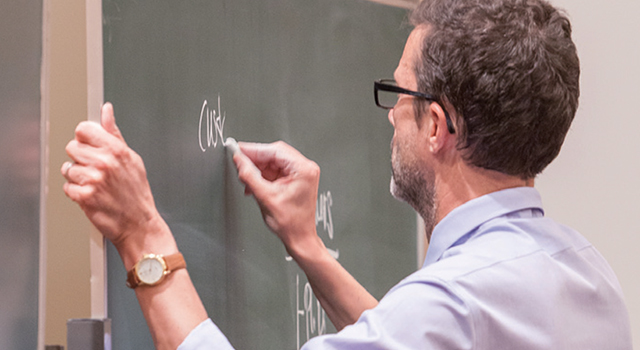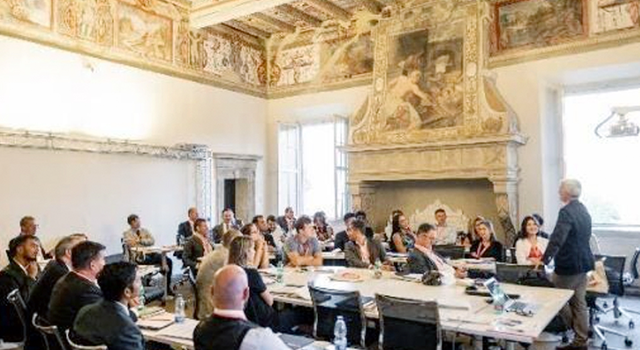- HOME
- Degree Program
- EMBA
- Overview of the EMBA...
Overview of the EMBA Subjects
Core Courses

- Provide a comprehensive knowledge base in eight functional areas of business needed for general business administration capability, centered around the practical case method approach
- Develop core management skills and fundamental knowledge in all relevant fields, including those already familiar from professional experiences
- Accounting and Control
- Develop analytical skills for accounting information through learning fundamentals of bookkeeping, financial statements, financial ratios and management accounting necessary for quantitative management methods
- Management Science
- Develop analytical skills for effective problem solving and opportunity identification for rational decision making which involves the application of mathematical modeling
- Organization and Human
Management - Organization management with focus on human behavior in organizations (micro-level organizational behavior) along with organization and strategy in management (macro-level organizational behavior)
- Marketing
- Learn effective market strategies for creating products and services that appeal to customers and effective expression and communication of product value to customers
- Business, Economy and Society
- Foster sound decision making ability in changing external environments by understanding external factors connected with people and organizations
- Financial Management
- Fundamentals of general and management finance, business valuation, capital cost calculation, financial strategy for managerial purposes, M&A, and corporate revitalization
- Production Policy
- Learn production and supply chain functions of business and how to identify and analyze problems to deal with the issues in order to gain competitive advantage through operations
- Business Policy
- Learn methodology to successfully formulate and implement the strategic plan and lead the organization from top decision makers' viewpoint in the context of management policy and solving strategy-related problems
Field courses

The purpose of Field Courses are to learn logical decision making process through analyses of actual management practices and their backgrounds, as a practical application of the fundamental management theories.
Students will address a strategic issues being faced by client companies through field researches on, and discussions with, the executives and key players of the companies.
| STEP1 ▶︎ | Preparations for Field Research |
|---|---|
| STEP2 ▶︎ | Field Research & Field Camp |
| STEP3 ▶︎ | Management Proposals |
Partner Companies in the Academic Year 2025

MIKI PULLEY CO., LTD.
With the cooperation of MIKI PULLEY CO., LTD. (Zama City, Kanagawa Prefecture), a comprehensive manufacturer of power transmission and control equipment with the largest share of the domestic market for pulley couplings, the students, who were divided into five groups (sales and marketing, production engineering, design and development, overseas business, and human resources), analyzed the company and prepared questions in advance, which were then shared with all team members. They then visited "MIKIPULLEY YONEZAWA CO., LTD. " in Yonezawa City, Yamagata Prefecture, "MIKI BELTEC CO., LTD.", the technical center and "MIKIPULLEY SAGAMI CO., LTD. " in Zama City, Kanagawa Prefecture, conduct site visits and interviews to gain a multifaceted understanding of the company and its challenges.

TOKUSHIMA
This is the eighth year we have worked for local development by mobilizing all of the first-year students' learning and their own knowledge in the real world to solve social issues raised by local governments with a business school- style approach of on-site, real-world fieldwork.
Four issues raised by the Tokushima Prefectural Government are: "Expansion of migration and marriage support," "securing human resources," "regional development in the southern region," and "regional development in the western region."
Students were divided into four groups and conducted interviews with the prefectural governor, prefectural government, local businesses, immigrants, educational institutions, and other key persons, as well as business site visits, with the cooperation of the prefectural government and various support from Tokushima Taisho Bank.
They had a thorough discussion over the analysis of the information and data collected and the strategic direction of the project, and recommended measures to solve viable and sustainable issues for the near future that could be back-cast from the vision of the future they wanted to have.
Overseas
Short-term field studies organized in cooperation with partner schools mainly in North America, Asia and Africa
Discussion with Leaders Courses

In this course, students meet business leaders, cabinet members, artists and other key figures who are at the forefront of respective fields.
The discussions aim to create an active learning environment through three steps: preparatory research before meetings, interactive lectures, and review of what was learned.
Global Management Seminar Coursess

KBS welcomes visiting lecturers from leading business schools abroad to provide opportunities for learning about the diversity of mindsets in the world and reconsidering one's own set of values against this global backdrop. In contrast to merely gaining new knowledge about the world, the Global Management Seminar Courses aim at stimulating the students to extend their own perception through discussions with the visiting lecturers.
Elective Courses

For professional success, business leaders must gain both general and specialized skills. Elective Courses cover each core field of business management and are taught by instructors who also have extensive academic research backgrounds in their respective fields.
List of Courses
- GLOBAL PRODUCTION MANAGEMENT
- IGPI REAL BUSINESS
- BUSINESS PRODUCING-GROWTH
- MODERN ART & BUSINESS
- WORKSHOP ON DATA ANALYSIS
- CORPORATE MANAGEMENT, ECONOMIC TRENDS AND FINANCIAL MARKETS
Individual Research Courses

The classes aim at providing an opportunity for deeper study into issues that cannot be covered in other courses. Based on the students' awareness of today's business world and problem consciousness, they attempt to create a solution for an issue they are facing either in their private or professional lives. In their research project, MBA candidates receive guidance from faculty members with expertise related to their research topics.
Visionary Project Courses

"The aim of this course is for executive students to envision a desirable future with a cause in 30 to 40 years ahead, back-cast the future to the present to figure out the gap, and construct social/business strategies to fill the gap from the global viewpoint.
Business managers often focus on mid to short term strategy plans based on the "forecasting method." Executive students in this course are expected to nurture long term views instead.
Students are also expected to combine their learnings and knowledge they earned during the field course and the overseas field course into this project.
The outcome of this project is publicly released every year to disseminate the idea of the cohort.
Global Executive

The Graduate School of Business Administration at Keio University is a member of the EMBA Consortium, an educational partnership organization of 11 business schools from around the world, and has been active since 2019. The main pillar of Consortium activities is the week-long International Week (Summer Program), which is held simultaneously around the world each September by each member school.
EMBA students from each school are to be spread across the 11 member schools, with the majority of participants in one program consisting of EMBA students from the other 10 schools and a small number of EMBA students from their own school. Each program, which substantially lasts five days, combines company visits, country visits, case discussions and lectures in each school's campus. Participants will have the opportunity to understand the business environment and opportunities in the country's economy, society, culture, etc.
Most valuable of all is the truly global perspective that is to be inspired by interacting with executives with the extremely diverse national and cultural backgrounds who come together as if it were a mini-UN. International Week is conducted as a regular course for current students of member schools, and alumni are also welcome to participate when programs have room for more participants.
List of member schools (alphabetical order, as of May 2025)
- Bologna Business School(Bologna, Italy)
- Cranfield School of Management(Cranfield, United Kingdom)
- ESAN Business School(Lima, Peru)
- FGV-EBAPE(Rio de Janeiro,Brazil)
- FIU: Chapman Graduate School of Business(Miami, USA)
- Jagdish Sheth School of Management.(Bengaluru, India)
- Keio Business School(Yokohama,Japan)
- Kozminski University(Warsaw, Poland)
- Munich Business School(Munich, Germany)
- The Lucas Graduate School of Business(California, USA)
- University of Stellenbosch Business School(Cape Town, South Africa)
International Exchange Program

For MBA candidates whose professional life makes it possible, KBS offers a chance to apply for student exchange in one of the 50 partner schools around the world. The International Exchange Program takes place for one term during the second term of the second year and offers an additional opportunity for learning about management in the international context.
